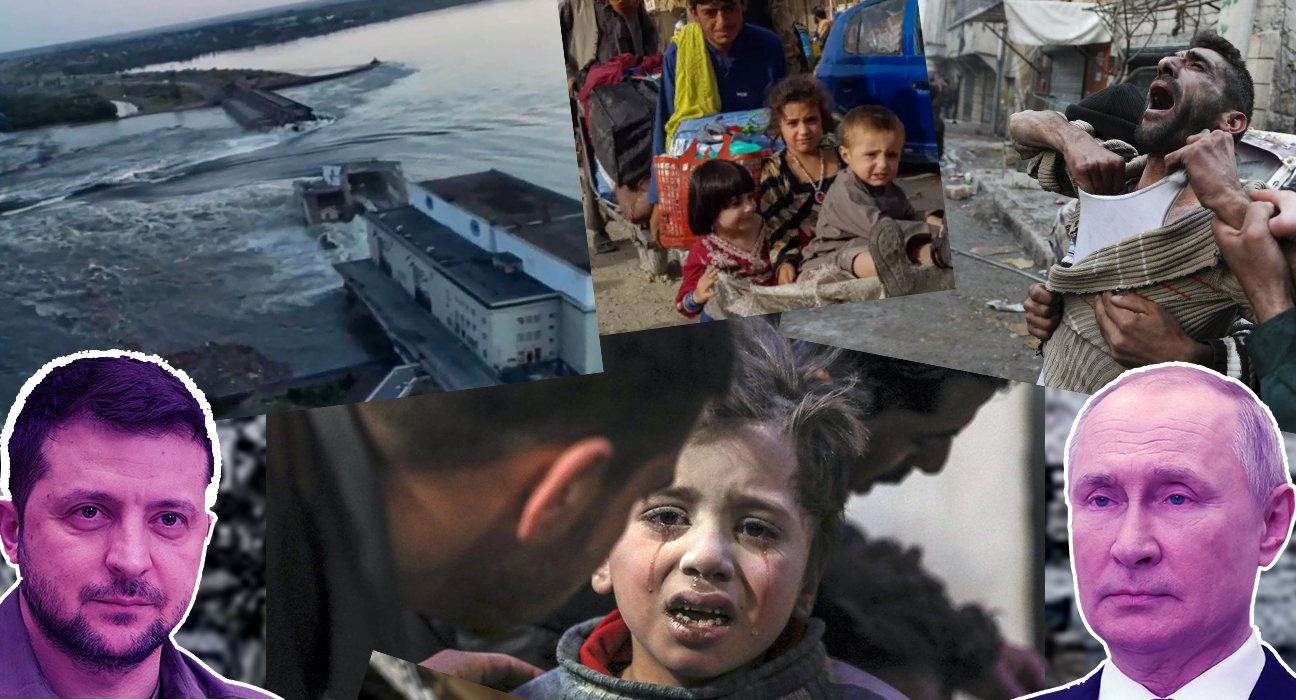The United Nations Secretary-General recently brought up the urgent and alarming situation developing in Ukraine during a press conference. Certainly, the focus of concern was the collapse of the Kakhovka hydroelectric power plant dam due to wars. This catastrophic event, coupled with the ongoing Russian invasion, has unleashed a series of devastating consequences on the region. Above all, the Secretary-General emphasized the urgent need for humanitarian assistance and safe access to affected areas.
The dam’s collapse has also raised concerns about the safety of Europe’s largest nuclear power plant, called Zaporizhzia. There are accusations that Russian forces are responsible for the dam’s destruction, which has made the situation even more tense. Numerous lives have been disrupted by the dam collapse, leaving people without houses, clean water to drink, and essential services.
The Tragic Price Of Wars!
Let’s start by looking at some recent, well-known wars that have had a profound impact on humanity. Millions of people have been traumatised by the ongoing war in Syria, which started in 2011. It has led to extensive destruction and displaced populations. High incidences of mental health illnesses have been linked to continual exposure to violence, loved ones’ deaths, and living in constant terror. Even decades of conflict in Afghanistan, starting with the Soviet invasion in 1979 and continuing even today, have terribly affected the population’s mental health. Even Iraq’s population has endured great suffering as a result of the country’s war, which started in 2003.
In each of these situations, the difficulty in obtaining mental health care is made worse by the devastation of the healthcare system and the scarcity of supplies in war zones. War has severe effects on mental health, affecting not only individuals, but also families and communities. This raises the question of what exactly the effects of conflict are on mental health. Let’s explore this topic today!
Going Beyond The Physical Damage
War, an unfortunate reality in our world, extends beyond physical conflict and inflicts deep-seated wounds on the mental health of individuals caught in its crossfire. Beyond the visible devastation, the psychological toll of war remains hidden, but its effects are far-reaching. Most of us can’t even imagine being exposed to such unimaginable horrors, witnessing violence, loss, and destruction all around us.
This continuous trauma exposure causes severe psychological damage. Intense fear, depression, and a sense of powerlessness grip survivors as the unpredictable nature of war wrecks their lives. Post-traumatic stress disorder (PTSD), depression, anxiety, and other mental health diseases are only a few of the disorders that can result from the psychological trauma that war-affected populations face. Let’s take a closer look at a few of these.
Coming To The Invisible Damage
- Post-Traumatic Stress Disorder (PTSD): War exposes individuals to unimaginable trauma, resulting in the development of PTSD. Particularly vulnerable are those who undergo or witness potentially fatal situations, such as battles or bombings. PTSD can manifest as intrusive memories, nightmares, flashbacks, and intense emotional distress. The haunting echoes of war exist long after the conflicts cease, causing individuals to relive their traumatic experiences, hampering their ability to function and disrupting their daily lives.
- Depression: War brings immense devastation, sinking individuals into a deep state of despair. The loss of loved ones, destroyed homes, and displacement fill hearts with overwhelming grief, hopelessness, and sadness. Depression seizes both soldiers and civilians, stealing their happiness, drive, and sense of meaning. The weight of war crushes them, trapping them in an all-consuming darkness that never seems to fade.
- Anxiety Disorders: War breeds anxiety disorders in its chaotic and uncertain landscape. The ever-present danger, sudden explosions, and shattered routines create an atmosphere of constant worry. People caught in war may feel excessively anxious, have panic attacks, be hyper-alert, and be overwhelmed by a constant sense of impending disaster. The unpredictable nature of war only fuels their anxiety, making it difficult to find comfort.
The Cycle Of Suffering
Now, if the above section doesn’t seem bad enough then let us tell you, it goes beyond that. Basically, the scars of war trauma can endure for years, even passing down to future generations, like an unwelcome inheritance. Entire communities bear the weight of collective trauma. The memories of devastation, loss, and pain linger in the air and creep into the very fabric of society.
The greatest example is the survivors’ children born after the Hiroshima and Nagasaki atomic bombings. They also bear the weight of their parents’ trauma. The radiation effects have been passed down through generations, leading to health issues and a continued cycle of suffering.
While all is said and done, an action plan is important. Rebuilding shattered cities, bringing displaced communities back home, and healing psychological wounds are the monumental challenges that arise in the aftermath of war. More funding and resources are required to make post-war projects successful. In the reconstruction process, mental health should also be given priority. By committing funds to mental health services, we make an investment in the health of people and communities, laying the foundation for long-term healing.













Leave feedback about this